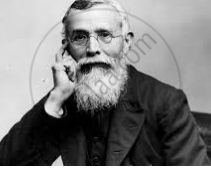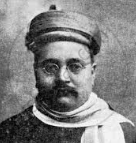Advertisements
Online Mock Tests
Chapters
2: The Executive (President and Vice-President)
3: The Prime Minister and The Council of Ministers
4: The Union Judiciary (The Supreme Court)
5: The State Judiciary (The High Court)
6: The State Judiciary (The Subordinate Courts)
7: First War of Independence: 1857
▶ 8: The Rise of Nationalism and Foundation of the Indian National Congress
9: The Programme and Achievements of the Early Nationalist
10: Rise of Assertive Nationalism
11: The Partition of Bengal
12: Formation of the Muslim League
13: The National Movement During the First World War (1915-1919)
14: Mahatma Gandhi & The National Movement (1919-1934)
15: Events Leading to the Quit India Movement (1935-1943)
16: Subhash Chandra Bose and the I.N.A
17: Towards Partition of India (1944-1947)
18: World War-I and Treaty of Versailles
19: Rise of Dictatorship and The Second World War
20: The United Nations (Origin and Purpose)
21: The United Nations Principal Organs – Composition and Functions
22: The United Nations (Major Agencies – Their Functions)
23: Universal Declaration of Human Rights
24: Non-Aligned Movement
![ICSE solutions for History and Civics [English] Class 10 ICSE chapter 8 - The Rise of Nationalism and Foundation of the Indian National Congress ICSE solutions for History and Civics [English] Class 10 ICSE chapter 8 - The Rise of Nationalism and Foundation of the Indian National Congress - Shaalaa.com](/images/history-and-civics-english-class-10-icse_6:5f2b1b2038084cf381bfa42c826a928c.jpg)
Advertisements
Solutions for Chapter 8: The Rise of Nationalism and Foundation of the Indian National Congress
Below listed, you can find solutions for Chapter 8 of CISCE ICSE for History and Civics [English] Class 10 ICSE.
ICSE solutions for History and Civics [English] Class 10 ICSE 8 The Rise of Nationalism and Foundation of the Indian National Congress Very Short Questions
Give a reason for the decline of cottage industries in India during the British rule.
In what way did the land revenue charged by the British, affect the Indian peasants?
What was the role of Zamindars during the British rule?
How could a moneylender exploit farmers during the British rule?
Who exposed the economic exploitation of India through his book ‘Poverty and Un-British Rule in India’?
What did Lord Ripon do against the British Policy of discrimination?
Why did the educated middle class people join the National Movement?
What feelings did the re-discovery of India’s past foster among Indians?
State the objective of the Landholders’ Society founded in 1837.
Name the two organizations, which merged in 1851 to form the British India Association of Bengal.
Mention any two objectives of the Bombay Association and the Madras Native Association, which were formed in 1852.
Why did the Britishers build roads and railways?
Name the British officer who promoted railway construction in India in the 19th century.
How did the means of communication help to unite Indians against the British?
Name the Act of Lord Lytton’s regime, which aims at limiting the freedom of the Press.
Who passed the Vernacular Act?
Who started the newspaper ‘TheYoung India’? Why did he start this paper?
Why was the Vernacular Press Act passed?
What was the principal objective of the Vernacular Press act of Lord Lytton?
Who repealed the Vernacular Press Act in 1882?
Who was Mr. A.O. Hume? What was his contribution towards Indian Nationalism?
Name the political organisation founded by Mr. A. O. Hume.
When and by whom was the Indian National Congress founded?
When and where was the first session of the Indian National Congress held?
Who presided over the first session of the Indian National Congress and how many attended it?
Or
Name the first President of Indian National Congress
What were the characteristic features of the Indian National Congress in the beginning?
Name the organisation that merged with the Indian National Congress in 1886.
Why is it said that in the beginning, the programme of the Congress was rather modest?
Why was the British Government friendly with the Congress in its initial stage?
Name the Viceroy who was well-disposed towards the Congress when it was being established.
ICSE solutions for History and Civics [English] Class 10 ICSE 8 The Rise of Nationalism and Foundation of the Indian National Congress Short Questions I
Give any two reasons to indicate that the revolt of 1857 was an important landmark in India’s struggle for freedom.
There were various factors that promoted the growth of Nationalism in India in the 19th century. Give the meaning of ‘Nationalism’ in this context.
Mention the popular ‘watchwords’ during the French Revolution which influence Indians due to the introduction of Western Education in India.
Give any two examples to indicate that the British followed the policy of economic exploitation in India.
What undue advantage did a moneylender have according to the land laws introduced by the British.
Give two reasons for industrial stagnation during the British rule in India.
State two repressive policies of Lord Curzon.
What was the aim of introducing English education in India?
Give two examples to show that the British followed the policy of discrimination against India.
What was Lord Lytton’s Vernacular Press Act of 1878?
Give two reasons for the resentment of the Indians against the British during Lord Lytton’s Viceroyalty.
How did the railways prove to be a blessing in disguise to Indians?
What role did the press play in fostering political ideas and patriotic sentiments among Indians in the National Movement?
What was the aim and purpose of Ilbert Bill?
Name the organisation which was the forerunner of the Indian National Congress.
Or
Name two fore-runners of the Indian National Congress.
When was the Poona Sarvajanik Sabha founded and by whom? What were its objectives?
When was the Indian National Congress established? Who presided over its first session?
Mention any two objectives for the formation of the Indian National Congress in 1885.
Mention any two principal objectives of the Indian National Congress as enumerated by its first President W.C. Bonnerjee.
Or
Mention one principal object of the founding of Indian National Congress.
ICSE solutions for History and Civics [English] Class 10 ICSE 8 The Rise of Nationalism and Foundation of the Indian National Congress Short Questions II
Mention any two factors that helped in the growth of Nationalism.
What was the influence of Western education on the minds of the educated Indians in the 19th Century?
What was the result of introducing English education in India.
In what way was the result of the untroduction of English was contrary to the expectation of the British?
Briefly discuss about the contribution of economic explotation towards Indian Nationalism.
Discuss in brief how the Ilbert Bill controvery helped in the growth of Nationalism in India.
Explain the role of rediscovery of Indians glorious past in the growth of Nationalism in India.
Briefly explain as to how the arms act infused the sense of national pride amongst the people of India.
In the context of growth of India Nationalism in the early phase, discuss the role of the Grand Durbar of 1877.
ICSE solutions for History and Civics [English] Class 10 ICSE 8 The Rise of Nationalism and Foundation of the Indian National Congress Long Questions
“Development of means of transport and communication was the major factor in the rise of the National Movement in India.” Discuss.
Briefly explain the contribution of racial pride of the British rulers towards Indian nationalism.
Explain about the role of western education in the rise of the National Movement in India.
“The vernacular press act was the main factor which infused the sense of national pride amongst the people of India.” Discuss.
Name the Indian language newspapers and literary books published in the early phase of Natioanlist Movement and disucss in brief about the role played by them in the growth of Indian Nationalism.
How did the British react when the Indian National Congress was founded? Why did their attitude change later?
What were the four aims of the Congress?
With reference to the growth of Indian Nationalism in the early phase, name a British viceroy who was very liberal in outlook and undid many repressive measures of his predecessor. Also discuss the role he played in the growth of Indian Nationalism.
ICSE solutions for History and Civics [English] Class 10 ICSE 8 The Rise of Nationalism and Foundation of the Indian National Congress Picture Based Questions
Read the extract given below and answer the questions that follow:
“… the Indians who actively worked for the creation of an all-India political organization represented new social forces that were increasingly opposed to the exploitation of India for British interests. They needed an organization that would fight for India’s political and economic advancement.”


From Freedom Struggle
Answer the following on the basis of above passage and pictures:
(i) In the context of the above, identify the two individuals in Pictures 1 and 2, who were the early leaders of the organization to be formed.
(ii) How did the person in Picture 1 explain the economic exploitation of India for British interest?
Solutions for 8: The Rise of Nationalism and Foundation of the Indian National Congress
![ICSE solutions for History and Civics [English] Class 10 ICSE chapter 8 - The Rise of Nationalism and Foundation of the Indian National Congress ICSE solutions for History and Civics [English] Class 10 ICSE chapter 8 - The Rise of Nationalism and Foundation of the Indian National Congress - Shaalaa.com](/images/history-and-civics-english-class-10-icse_6:5f2b1b2038084cf381bfa42c826a928c.jpg)
ICSE solutions for History and Civics [English] Class 10 ICSE chapter 8 - The Rise of Nationalism and Foundation of the Indian National Congress
Shaalaa.com has the CISCE Mathematics History and Civics [English] Class 10 ICSE CISCE solutions in a manner that help students grasp basic concepts better and faster. The detailed, step-by-step solutions will help you understand the concepts better and clarify any confusion. ICSE solutions for Mathematics History and Civics [English] Class 10 ICSE CISCE 8 (The Rise of Nationalism and Foundation of the Indian National Congress) include all questions with answers and detailed explanations. This will clear students' doubts about questions and improve their application skills while preparing for board exams.
Further, we at Shaalaa.com provide such solutions so students can prepare for written exams. ICSE textbook solutions can be a core help for self-study and provide excellent self-help guidance for students.
Concepts covered in History and Civics [English] Class 10 ICSE chapter 8 The Rise of Nationalism and Foundation of the Indian National Congress are Formation of the Indian National Congress, Factors Leading to the Growth of Nationalism, Objectives of the Indian National Congress, Sessions of the Indian National Congress, Precursors of the Indian National Congress, Economic Exploitation, Repressive Colonial Policies, Growth of Nationalism, Socio-Religious Reform Movements, Role of the Press.
Using ICSE History and Civics [English] Class 10 ICSE solutions The Rise of Nationalism and Foundation of the Indian National Congress exercise by students is an easy way to prepare for the exams, as they involve solutions arranged chapter-wise and also page-wise. The questions involved in ICSE Solutions are essential questions that can be asked in the final exam. Maximum CISCE History and Civics [English] Class 10 ICSE students prefer ICSE Textbook Solutions to score more in exams.
Get the free view of Chapter 8, The Rise of Nationalism and Foundation of the Indian National Congress History and Civics [English] Class 10 ICSE additional questions for Mathematics History and Civics [English] Class 10 ICSE CISCE, and you can use Shaalaa.com to keep it handy for your exam preparation.
